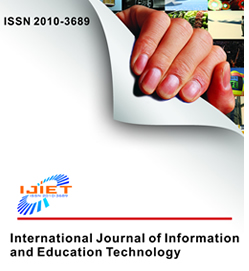About IJIET
International Journal of Information and Education TechnologyInternational Journal of Information and Education Technology (IJIET) is an international academic open access journal which gains a foothold in Singapore, Asia and opens to the world. It aims to promote the integration of information and education technology.
The focus is to publish papers on the application of mobile information and communication technology with computers as the core in education. Submitted papers will be reviewed by technical committees of the Journal and Association. The audience includes researchers, managers, and operators for information and education technology as well as designers and developers.
All submitted articles should report original, previously unpublished research results, experimental or theoretical, and will be peer-reviewed. Articles submitted to the journal should meet these criteria and must not be under consideration for publication elsewhere. Manuscripts should follow the style of the journal and are subject to both review and editing.




